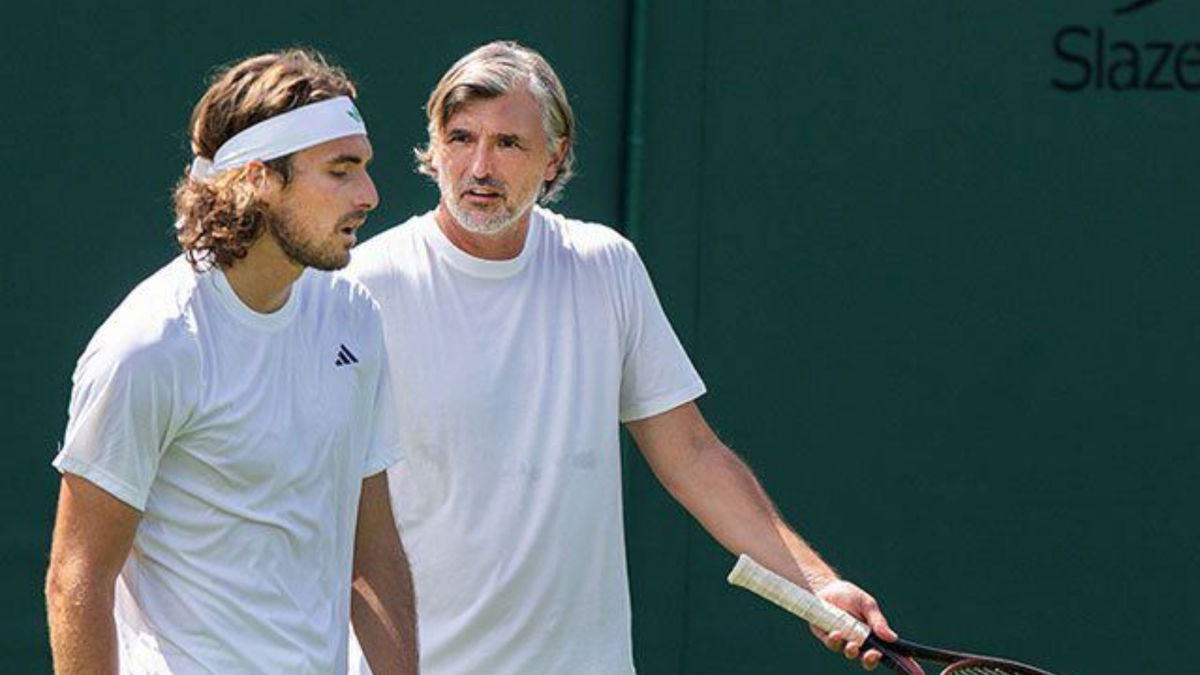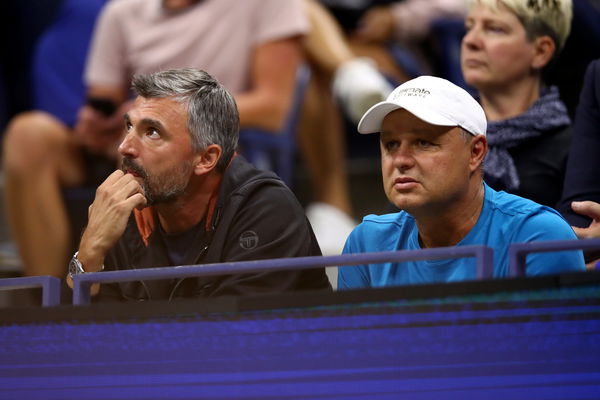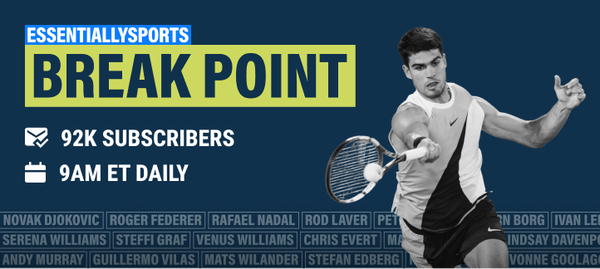
Imago
Image Credits: X

Imago
Image Credits: X
We’ve talked about mental health in tennis, but have we really heard it? When Naomi Osaka stepped away from the French Open in 2021, the world took notice. She wasn’t injured. She wasn’t tired. She was hurting. “I have suffered long bouts of depression since the US Open in 2018,” she said, adding that press conferences triggered her anxiety; she chose to skip press conferences at the French Open. Instead of support, she got fined $15,000 and threatened with disqualification. People called her dramatic, fragile, even selfish. But that emotional weight? It doesn’t just affect women in tennis. Men are breaking too. They’re just quieter about it. Until now. Because this time, it’s not a player opening up, it’s a coach blowing the lid off.
Watch What’s Trending Now!
Goran Ivanisevic, former Wimbledon champion and now coach to Stefanos Tsitsipas, didn’t sugarcoat anything in his recent interview with Clay Tennis. When he was asked about the hardest thing in coaching, he revealed, “Nobody here is normal,” he said. “This is a madhouse. , a psychiatric ward (laughter). He wasn’t being dramatic; he was being real. Ivanisevic explained that modern coaching has less to do with forehands and more to do with psychology. “It’s all in the head,” he said. And that pressure? It’s everywhere. If this sounds shocking, it really shouldn’t be.
ADVERTISEMENT
Nick Kyrgios has already shown us the cracks. In 2022, he wrote a raw, honest Instagram post about the 2019 season — a time when most fans thought he was just acting out. In truth, he was spiraling. “I was lonely, depressed, negative, abusing alcohol, drugs, pushing away family and friends… It was one of my darkest periods.” He even wore a compression sleeve, not for pain, but to hide the scars from self-harm. The public had called him arrogant and undisciplined. Now, many realized they had been watching someone cry for help in real-time. So when Ivanisevic says “Everyone’s on antidepressants,” it wasn’t just a throwaway line. It’s a mirror. A warning. A confession.

Getty
NEW YORK, NEW YORK – AUGUST 28: (L-R) Coaches Goran Ivanisevic and Marian Vajda watch as Novak Djokovic of Serbia plays during his Men’s Singles second round match against Juan Ignacio Londero of Argentina on day three of the 2019 US Open at the USTA Billie Jean King National Tennis Center on August 28, 2019 in the Flushing neighborhood of the Queens borough of New York City. (Photo by Clive Brunskill/Getty Images)
Behind the scenes, ATP players are under crushing pressure to perform, to travel nonstop, to meet the expectations of fans, sponsors, family, and the media, all while pretending they’re completely bulletproof. But as Goran Ivanisevic puts it, that pressure builds up in ways most people don’t see, “The hardest part is dealing with all the player madness. I get it more easily because I was a player, I had my madness too,” he says. “We can prepare them, but down there it’s a battle. A coach has to be a psychologist. It’s less about teaching forehands and backhands now, it’s all in the head. In a couple of years, I could probably get a degree in psychology and give proper lectures.”
ADVERTISEMENT
And then comes the most revealing line of all, the one that pulls back the curtain entirely: “When I listen to players, everyone’s on antidepressants.” Zverev says. And for years, players have stayed quiet. Why? Because in men’s tennis, you’re not supposed to crack. You’re supposed to tough it out. But the truth is, toughness isn’t silence. It’s survival. It’s speaking out when no one else will. Between Kyrgios’s vulnerability and Ivanisevic’s brutal honesty, the ATP’s mental health crisis can’t be brushed under the rug anymore. These aren’t one-off stories. This is a pattern. And now, even Goran Ivanisevic is experiencing it firsthand through the very player he’s coaching.
ADVERTISEMENT
Goran Ivanisevic became Stefanos Tsitsipas’s lifeline in tennis
In May 2025, just after Stefanos Tsitsipas’s shocking second-round French Open exit a 6–4, 5–7, 6–2, 6–4 loss to qualifier Matteo Gigante, he hit the panic button. He hired Goran Ivanisevic, and the timing couldn’t have been more critical. Tsitsipas was unraveling, physically strained, mentally drained, and slipping from the elite tier he once commanded. He knew what was at stake. Just a year earlier, he’d admitted that tennis had “brought me down very psychologically and emotionally.” The pressure, the injuries, the burnout, it wasn’t just hurting his game. It was bleeding into his mind. That unraveling started long before 2025.
ADVERTISEMENT
During the Covid-19 pandemic in 2020, Tsitsipas experienced what can only be described as a mental block. The rigid “bubble life” of the tour isolated him, and he spoke openly about its emotional toll after the ATP Finals that year: “I’m very happy that I didn’t break down… I felt very dark at times, very lonely.” The testing, the silence between matches, and the emptiness of hotel rooms became toxic. Even social media turned hostile, a spiral so consuming he had to step back and detox. And that’s when it became clear: for Tsitsipas, the real opponent wasn’t across the net. It was in his own head.
That’s where Ivanisevic stepped in, not just as a coach, but as a necessary intervention. From day one, he cut straight to the truth: “If he solves some things outside of tennis, then he has a chance and he’ll return to where he belongs, because he’s too good a player to be out of the top 10.” This wasn’t about fixing forehands or fine-tuning footwork, this was about survival. Tsitsipas has since said he wishes their partnership had started three or four years earlier. Because now, it’s not just about winning titles. It’s about enduring the demands of the sport without crumbling under them.
ADVERTISEMENT
And no, Ivanisevic doesn’t sugarcoat it. “With this knee, I’m three times more fit than him,” Ivanisevic said, half-joking but dead serious. But that’s exactly the kind of tough love Stefanos craves. “Goran is strict and very tough on me. Any other player would get scared… ‘How dare he talk to me like that?’ You know? He takes it personally. But I need that… I need the truth, and I need someone who’s tough on me. And that’s the foundation I’ll build on. Of course, he respects me…”
In tennis that often asks men to bottle things up, here’s a player begging for honesty and a coach who delivers it. Because when the head’s not right, even a top-10 talent can lose his way. But maybe, with the right voice in his corner, one that challenges, checks, and calls him out, Stefanos Tsitsipas is finally on the path to finding himself again.
ADVERTISEMENT
ADVERTISEMENT
ADVERTISEMENT
ADVERTISEMENT
